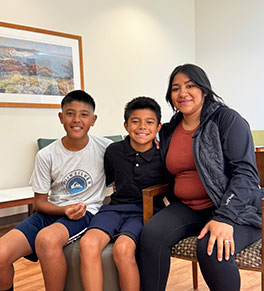
Family Medicine
The UCI Health Family Medicine program provides family-centered primary care for patients of all ages, from newborns to the elderly, across a range of conditions.
Our approach to family medicine
When we treat you and your loved ones, we consider all factors, including your family, history and environment. You will receive an innovative, compassionate level of healthcare on a holistic level.
At UCI Health, we see ourselves as your family’s health partner, helping you navigate everything from routine checkups to complex medical needs. Our family medicine doctors provide a wide range of services, including:
- Preventive care and annual wellness visits
- Chronic disease management (e.g., diabetes, hypertension)
- Women's health services, including prenatal care and contraceptive management
- Minor procedures, such as joint injections and skin biopsies
- Pediatric and adolescent care
- Geriatric health services
We also act as “quarterbacks” for your care, coordinating with specialists to ensure you receive the best treatment across all health concerns.
Looking for more options?
View all clinicians
Schedule an appointment with an family medicine physician near you
Call 714-456-7002 or
Featured Blog Posts

Fireworks survivor and his mom advocate safety above all
Cynthia Garcia, whose younger son lost several fingers to an exploding firework last July, says parents must teach their kids to steer clear of the devices.

MIND food: Blissful recipes to boost brain health

Dreamy dishes for restful sleep
Conditions we treat
Whether we are treating your newborn or your grandparent, we provide family-centered primary across a range of conditions, including:
- Colds, flu, and fevers
- Respiratory illnesses like asthma
- Chronic diseases such as diabetes and heart disease
- Sports-related injuries like sprains and strains
- Mental health conditions, including anxiety and depression
- Women’s health issues, from menstrual irregularities to prenatal care
Related tests and treatments
- Immunizations for children and adults
- Diabetes education and nutritional counseling
- Smoking cessation support
- Preoperative evaluations
- Women’s health procedures, including Pap smears and IUD placement
- Flexible sigmoidoscopy and skin biopsies
Why choose UCI Health for family medicine?
Expert care
Our family medicine team is part of Orange County’s only academic health system. This means you benefit from evidence-based care and access to cutting-edge medical advancements. We help you and your family achieve optimal health.
Care for everyone
We treat patients of all ages, offering personalized care plans for every stage of life.
Coordinated, holistic care
Our doctors take the time to understand your family’s unique needs, providing guidance on preventive care and chronic condition management.
Dr. Jose Mayorga, executive director of the UCI Health Family Health Centers
“The UCI Health Family Health Centers have a long history of providing essential healthcare services to medically underserved communities regardless of their ability to pay,”
Read moreFeatured News Stories

Staying single might decrease dementia risk, says new study

Experts warn of firework dangers around Fourth of July, summer events





